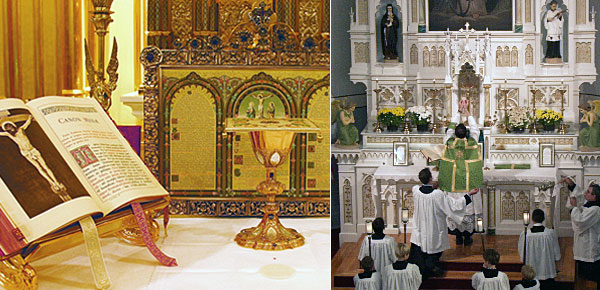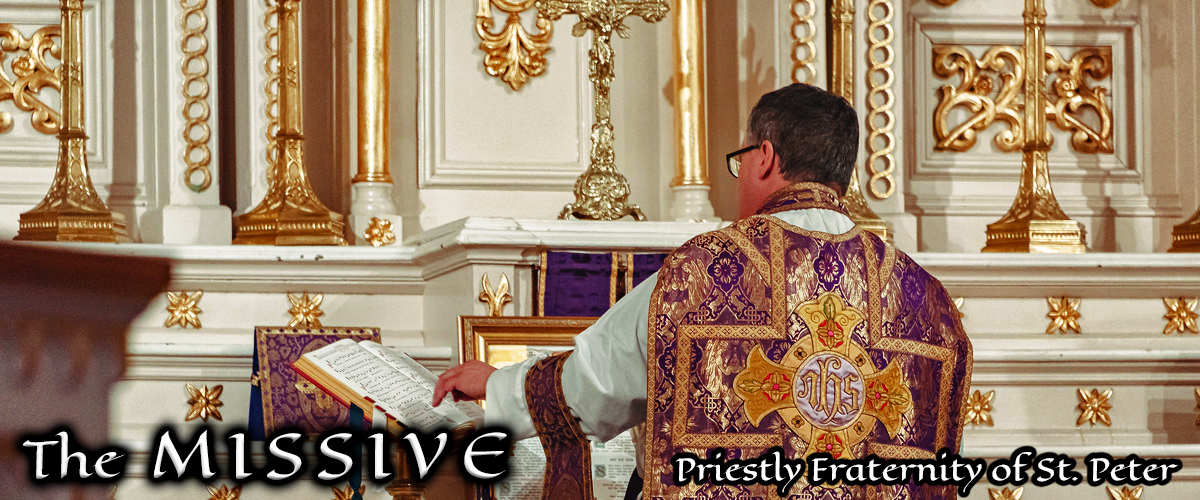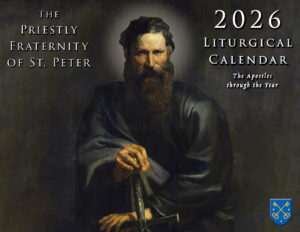FSSP Sung Mass Training – May 2012
For the week of May 7-12, 2012, a Sung Mass (Missa Cantata) training workshop will be offered at Our Lady of Guadalupe Seminary in Denton, Nebraska. In this five day training session priests can receive the following:
- Comprehensive hands-on instruction and training in the ceremonies of Sung and Solemn Masses
- A comprehensive overview and practice in the chants of the Missa Cantata.
- Complete training in all the altar server positions for Sung Mass.
The cost as usual will be $400, which includes a $100 non-refundable deposit. Please visit the FSSP Priest Training website for all of the details, to sign up, or contact Father Joseph Lee, FSSP, JCL with questions. Financial assistance may be available via Una Voce America.

March 15, 2012

Summer Retreats 2012
 Fr. James Buckley, FSSP, Retreat Master, will give retreats based on the Spiritual Exercises of St. Ignatius Loyola at the following locations:
Fr. James Buckley, FSSP, Retreat Master, will give retreats based on the Spiritual Exercises of St. Ignatius Loyola at the following locations:
Our Lady of Guadalupe Seminary Denton, Nebraska
Men’s Retreat June 7-10, 2012
Private room and meals provided.
Women’s Retreat June 18-21, 2012
Semi-private room and meals provided at nearby retreat house.
Retreats begin at 6:00pm on Monday and end with brunch at 11:00am on Thursday.
Cost is $175.00
Appropriate dress is requested.
Call (402) 797-7700 and ask for Mr. Coleman or e-mail business@fsspolgs.org
St. Benedict Abbey Still River (Harvard), Massachusetts
3-Day Women’s Retreat: July 27-29, 2012 (Fri-Sun)
3-Day Men’s Retreat: August 10-12, 2012 (Fri-Sun)
Cost is $230.00
Includes meals, room and board, and (now mandatory) liability insurance. Arrival time is the Thursday evening before the retreat begins.
For information, contact Mr. James Buxton, preferably by e-mail: janthonybuxton@yahoo.com or call (978) 957-3118 and leave a message.(you will hear the phone message “You have reached Pa and Babchi.”)
February 28, 2012

Sacramento Retreat Scheduled – Aug. 20-24, 2012
“A Deeper Look at the ‘Our Father”
A retreat, sponsored by St. Stephen, the First Martyr Parish in Sacramento, CA will be given by Fr. Gerard Saguto, FSSP. The retreat will run August 20 – 24, 2012 at Christ the King Retreat Center, Citrus Heights, CA. Private room & bath for each retreatant, and is open to both men and women.
Cost for the retreat is $385.00.
For more information call 916-455-5114 or 916-223-3112.
http://sacfssp.com/
February 23, 2012

Confraternity of St. Peter: Letter from the General Chaplain
Dear Members of the Confraternity of Saint Peter,
Fraternal greetings in Our Lord and in St Peter our Patron.
Feb. 2, 2012
Introduction: This letter is to thank you. In exactly three weeks, we will celebrate the 5th anniversary of the foundation of the Confraternity of Saint Peter. [N.B. Ash Wednesday taking precedence as a universal feria of the 1st class, our particular 1st class feast of the Chair of St Peter is transferred this year to the following day, i.e. Thursday 23 February 2012. On that day then, rather than on the 22nd February, you can gain the plenary indulgence at the usual conditions.] In that perspective I am writing to you to express the gratitude of our priests and seminarians for your lasting commitment and for your generous support to our vocations and to our ministry.
History: Following a resolution by the last General Chapter (2006) of the Priestly Fraternity of St Peter, the Confraternity of Saint Peter was founded on 22 February 2007 as an answer to the petitions of fellow Catholics desiring to be more closely associated to the ministry of our Fraternity. Not being a religious order, we do not run a third order as such, but we could offer our faithful the support of a sodality. From medieval times sodalities had proved a deeply traditional and efficient way of sanctification for the laity and for the clergy: such time-proofed instruments are not obsolete in the current dechristianisation. This is to our mutual advantage, as CSP members and FSSP members pray for each other and support each other according to our respective vocations.
Commitments: Five years later the Confraternity numbers 3,750 worldwide. As members (Catholic with minimum age fourteen) you commit to: every day: 1) pray one decade of the Holy Rosary for the sanctification of our priests and for our priestly vocations, 2) and recite the Prayer of the Confraternity; and every year: 3) have the Holy Sacrifice of the Mass offered once for these intentions.
Please remember to fulfil those obligations. If you find that you cannot do it anymore, please notify your chaplain of your decision, so as to avoid theoretical membership. Your commitments cease when you receive written acknowledgment from your CSP chaplain. If as expected every enrolled member does fulfil his or her daily and yearly commitments, then every day 3,750 decades of the Rosary and as many times the specific Prayer are offered for the intentions of our priests and seminarians. Every day also, at your request, over ten Holy Masses are offered in support of our priestly ministry and to foster priestly vocations to our Fraternity.
God’s holy Harvest: Dear Friends, the ‘Master of the Harvest’ hears you! Our international seminaries have been blessed with an unprecedented intake of 49 and 44 applicants in the last two years, bringing the total number of our seminarians to 162 – over 80 in each of our seminaries. Furthermore, whereas many religious and diocesan institutions undergo dramatic variations, the number of our priestly ordinations is characterised by a remarkable stability, with an average 12 priests ordained each year since 2000. Undoubtedly, your dedication and intercession as members of the Confraternity of Saint Peter are a decisive factor in those achievements. Thankfully, even more people outside the Confraternity pray for us daily: but the 3,750 of you do so with the intention of fulfilling a formal commitment, whence increased merits and graces.
In return, you may rely on the spiritual benefits gained by you as members of the Confraternity. Your commitments place you among our most faithful benefactors, and as such, among the particular recipients of our 390 priests’ and seminarians’ daily prayers. The Holy Sacrifice of the Mass is offered each month for the members of the Confraternity in each area. According to our abilities and to your expectations, recollections and instructions in the faith are also offered. I would like on your behalf to thank the regional CSP chaplains who, as well as taking care of their local apostolate, spur efforts to provide for you in linguistic areas stretching across several countries: Fr James Fryar for the English-speaking Region, Fr François Pozzetto for the French-speaking Region, and Fr Stefan Reiner for the German-speaking Region.
Lay members and more: In places where there is no stable FSSP ministry yet, the Confraternity of St Peter provides a rare opportunity for people to become members of our spiritual family despite the distance. Where the FSSP is already established, CSP members are often among our most dedicated parishioners.
Please note that the Confraternity is not for lay Catholics only. From the beginning, consecrated persons, either religious or clerics, have been expected to join as well. To this date, over a hundred have. In Great Britain only, for example, already ten parish priests have joined the Confraternity. There are no extra commitments for clergy. The only difference is that priest members would offer the annual Mass for the Confraternity themselves, rather than have it said by another priest. Especially when they feel isolated and sidelined due to their courageous attachment to the Roman traditions, religious and diocesan priests (and future priests) find spiritual solace in joining the Confraternity as added members of our priestly family, even though they may not intend to join the FSSP. “12. To aid the sanctification of the clergy, the Fraternity of Saint Peter will offer priests the possibility of retreats and days of recollections. The houses of the Fraternity could host priestly fraternities, and journals could be published for the sanctification of priests. The Fraternity will be pleased to come to the aid of aged or sickly priests, or those with special needs” (emphasis ours – cf Constitutions of the FSSP, definitively approved by the Holy See on 29 June 2003). There is no canonical objection either to male and female religious fulfilling the CSP commitments, at their superiors’ discretion. I thus exhort all members to suggest to sympathetic priests, deacons and religious to join the Confraternity.
Information: Some of your acquaintances may simply not know about the Confraternity. Please kindly tell them about it and direct them to your local chaplain. An efficient way is also to hand out to them flyers about the Confraternity and enrolment forms, that they may have concrete material to consider and may ask you questions if they wish. Since the Prayer of the Confraternity refers to priestly vocations and priestly ministry in a general sense, you may also suggest to your local pastor, even though he may not be a member of the FSSP or of the CSP, that the same Prayer be recited before the Blessed Sacrament exposed, asking “the master of the harvest to send out labourers for his harvest” (Mt 9:38).
Conclusion: The Confraternity of St Peter is a light and simple way of strengthening the family ties between souls and Holy Mother Church and God, through the ministry of the Priestly Fraternity of St Peter. As a special intention dear to our spiritual family, may I take the opportunity of this letter to ask for your prayers in particular for the success of our next General Chapter, to take place in our American seminary from 3rd to 18th July 2012? I thank you for your generous commitment and I assure you of my prayers for you, especially this 23rd February on the 5th anniversary of our Confraternity.
Cordially in St Peter,
Fr Armand de Malleray, FSSP
General Chaplain of the Confraternity of St Peter.
February 22, 2012

On the Feast of the Purification of the Blessed Virgin Mary
Dear Members of the Confraternity of Saint Peter,
Fraternal greetings in Our Lord and in St Peter our Patron.
Introduction: This letter is to thank you. In exactly three weeks, we will celebrate the 5th anniversary of the foundation of the Confraternity of Saint Peter. [N.B. Ash Wednesday taking precedence as a universal feria of the 1st class, our particular 1st class feast of the Chair of St Peter is transferred this year to the following day, i.e. Thursday 23 February 2012. On that day then, rather than on the 22nd February, you can gain the plenary indulgence at the usual conditions.] In that perspective I am writing to you to express the gratitude of our priests and seminarians for your lasting commitment and for your generous support to our vocations and to our ministry.
History: Following a resolution by the last General Chapter (2006) of the Priestly Fraternity of St Peter, the Confraternity of Saint Peter was founded on 22 February 2007 as an answer to the petitions of fellow Catholics desiring to be more closely associated to the ministry of our Fraternity. Not being a religious order, we do not run a third order as such, but we could offer our faithful the support of a sodality. From medieval times sodalities had proved a deeply traditional and efficient way of sanctification for the laity and for the clergy: such time-proofed instruments are not obsolete in the current dechristianisation. This is to our mutual advantage, as CSP members and FSSP members pray for each other and support each other according to our respective vocations.
Commitments: Five years later the Confraternity numbers 3,750 worldwide. As members (Catholic with minimum age fourteen) you commit to: every day: 1) pray one decade of the Holy Rosary for the sanctification of our priests and for our priestly vocations, 2) and recite the Prayer of the Confraternity; and every year: 3) have the Holy Sacrifice of the Mass offered once for these intentions.
Please remember to fulfill those obligations. If you find that you cannot do it anymore, please notify your chaplain of your decision, so as to avoid theoretical membership. Your commitments cease when you receive written acknowledgment from your CSP chaplain. If as expected every enrolled member does fulfill his or her daily and yearly commitments, then every day 3,750 decades of the Rosary and as many times the specific Prayer are offered for the intentions of our priests and seminarians. Every day also, at your request, over ten Holy Masses are offered in support of our priestly ministry and to foster priestly vocations to our Fraternity.
God’s holy Harvest: Dear Friends, the ‘Master of the Harvest’ hears you! Our international seminaries have been blessed with an unprecedented intake of 49 and 44 applicants in the last two years, bringing the total number of our seminarians to 162 – over 80 in each of our seminaries. Furthermore, whereas many religious and diocesan institutions undergo dramatic variations, the number of our priestly ordinations is characterised by a remarkable stability, with an average 12 priests ordained each year since 2000. Undoubtedly, your dedication and intercession as members of the Confraternity of Saint Peter are a decisive factor in those achievements. Thankfully, even more people outside the Confraternity pray for us daily: but the 3,750 of you do so with the intention of fulfilling a formal commitment, whence increased merits and graces.
In return, you may rely on the spiritual benefits gained by you as members of the Confraternity. Your commitments place you among our most faithful benefactors, and as such, among the particular recipients of our 390 priests’ and seminarians’ daily prayers. The Holy Sacrifice of the Mass is offered each month for the members of the Confraternity in each area. According to our abilities and to your expectations, recollections and instructions in the faith are also offered. I would like on your behalf to thank the regional CSP chaplains who, as well as taking care of their local apostolate, spur efforts to provide for you in linguistic areas stretching across several countries: Fr James Fryar for the English-speaking Region, Fr François Pozzetto for the French-speaking Region, and Fr Stefan Reiner for the German-speaking Region.
Lay members and more: In places where there is no stable FSSP ministry yet, the Confraternity of St Peter provides a rare opportunity for people to become members of our spiritual family despite the distance. Where the FSSP is already established, CSP members are often among our most dedicated parishioners.
Please note that the Confraternity is not for lay Catholics only. From the beginning, consecrated persons, either religious or clerics, have been expected to join as well. To this date, over a hundred have. In Great Britain only, for example, already ten parish priests have joined the Confraternity. There are no extra commitments for clergy. The only difference is that priest members would offer the annual Mass for the Confraternity themselves, rather than have it said by another priest. Especially when they feel isolated and sidelined due to their courageous attachment to the Roman traditions, religious and diocesan priests (and future priests) find spiritual solace in joining the Confraternity as added members of our priestly family, even though they may not intend to join the FSSP. “12. To aid the sanctification of the clergy, the Fraternity of Saint Peter will offer priests the possibility of retreats and days of recollections. The houses of the Fraternity could host priestly fraternities, and journals could be published for the sanctification of priests. The Fraternity will be pleased to come to the aid of aged or sickly priests, or those with special needs” (emphasis ours – cf Constitutions of the FSSP, definitively approved by the Holy See on 29 June 2003). There is no canonical objection either to male and female religious fulfilling the CSP commitments, at their superiors’ discretion. I thus exhort all members to suggest to sympathetic priests, deacons and religious to join the Confraternity.
Information: Some of your acquaintances may simply not know about the Confraternity. Please kindly tell them about it and direct them to your local chaplain. An efficient way is also to hand out to them flyers about the Confraternity and enrollment forms, that they may have concrete material to consider and may ask you questions if they wish. Since the Prayer of the Confraternity refers to priestly vocations and priestly ministry in a general sense, you may also suggest to your local pastor, even though he may not be a member of the FSSP or of the CSP, that the same Prayer be recited before the Blessed Sacrament exposed, asking “the master of the harvest to send out labourers for his harvest” (Mt 9:38).
Conclusion: The Confraternity of St Peter is a light and simple way of strengthening the family ties between souls and Holy Mother Church and God, through the ministry of the Priestly Fraternity of St Peter. As a special intention dear to our spiritual family, may I take the opportunity of this letter to ask for your prayers in particular for the success of our next General Chapter, to take place in our American seminary from 3rd to 18th July 2012? I thank you for your generous commitment and I assure you of my prayers for you, especially this 23rd February on the 5th anniversary of our Confraternity.
Cordially in St Peter,
Fr Armand de Malleray, FSSP
General Chaplain of the Confraternity of St Peter

Kansas City Gets a New Church
 The St. Rose Philippine Duchesne Latin Mass Community in the archdiocese of Kansas City, Kansas, is excited to announce they will soon be moving into their own church! Exterior repairs have already begun on what was formerly the Westwood Lutheran Church on Rainbow Blvd but what will soon be the Catholic Parish of St. Rose Philippine Duchesne. The new church is centrally located in Kansas City in the northeastern most section of Johnson Co. Workers just finished repairing the old bell tower and a new 6-foot tall Catholic cross now stands gloriously atop this formerly Protestant edifice.
The St. Rose Philippine Duchesne Latin Mass Community in the archdiocese of Kansas City, Kansas, is excited to announce they will soon be moving into their own church! Exterior repairs have already begun on what was formerly the Westwood Lutheran Church on Rainbow Blvd but what will soon be the Catholic Parish of St. Rose Philippine Duchesne. The new church is centrally located in Kansas City in the northeastern most section of Johnson Co. Workers just finished repairing the old bell tower and a new 6-foot tall Catholic cross now stands gloriously atop this formerly Protestant edifice.
Interior renovations are scheduled to begin soon. The sanctuary will be remodeled with three altars and a communion rail. The choir loft will be extended and a real pipe organ (left behind by the generous Lutherans) installed in the loft. Confessionals must also be added and the sacristy remodeled. The new church also comes with a basement and kitchen which will function as a parish hall for coffee and donuts, parish dinners, classrooms for catechism class, and a room for mothers and children. All the necessary furnishings soon to be put in place for a real functioning full-fledged parish community!
The church also comes with a rectory for the priests! A parish workday was held shortly before the exterior renovations began and over 90 members of the community turned up to rake leaves, trim hedges and trees, do some landscaping, and clean up the property to get it ready for the priests to move in.
The Latin Mass Community of Kansas City, Kansas was founded by Archbishop James P. Keleher in 1988 and entrusted to the care of the Priestly Fraternity of St. Peter in 1996. Initially it was served as a satellite of the apostolate in Maple Hill, Kansas. Fr. Edouard de Mentque, FSSP would travel to say Sunday Mass at St. Mary’s-St.Anthony’s Church in downtown Kansas City, KS. Later it grew into an apostolate of its own right with Fr. de Mentque as its first chaplain who placed the community under the patronage of St. Rose Philippine Duchesne. The community then moved into its present location at Blessed Sacrament Parish on Parallel Parkway. Fr. de Mentque was succeeded by Fr. Philip Wolfe, FSSP in 2002 who grew the apostolate substantially over the next seven years. Fr. Wolfe was succeeded by Fr. John Fongemie, FSSP in 2009 who, in light of the motu proprio Summorum Pontificum, recognized the need for the community to have its own church so that it could grow into a parish of its own right and ensure a permanent and proper home for the Traditional Latin Mass in Kansas City.
The sale of the old rectory and a fundraising drive soon to kick off will hopefully raise the necessary funds to complete the interior renovations and the community looks forward to a dedication ceremony sometime in the Spring of 2012. Many thanks go out to all those who have helped make this transition such a success especially Archbishop Joseph F. Naumann who has been so supportive of the Fraternity of St. Peter and the Latin Mass in his archdiocese. Please keep the community in your prayers as we take this next step forward in furthering the work of God in this little corner of His vineyard.
If you are interesting in helping us with this project please visit our website: www.kclatinmass.com and click on the “Building Project Update.”
St. Rose Philippine Duchesne Latin Mass Community
5035 Rainbow Blvd.
Westwood, KS. 66205
ph: (913) 236-0005
www.kclatinmass.com
February 15, 2012

Ordinations – Spring 2012
The Priestly Fraternity of St. Peter is happy to announce the following Priestly Ordination date:
- On Saturday, March 17th, Bishop Alexander Sample of the Diocese of Marquette, MI, conferred Diaconate ordinations at Our Lady of Guadalupe Seminary in Denton, NE.
- On Saturday, May 19th, Bishop Fabian Bruskewitz of the Diocese of Lincoln, NE, will confer Priestly ordinations at the Cathedral of the Risen Christ in Lincoln, NE.
On Saturday, March 17th, Bishop Alexander Sample of the Diocese of Marquette, MI, conferred Diaconate ordination on five men. See more information about the 2012 Diaconate ordinations or sign up for our newsletter for full coverage.
February 8, 2012

Seven Fraternity Seminarians Ordained Subdeacons
His Excellency, Bishop Fabian Bruskewitz (Diocese of Lincoln, Nebraska) ordained seven Priestly Fraternity of St. Peter seminarians to the Subdiaconate on Saturday, January 28, 2012. The ceremony took place in the Chapel of Sts. Peter and Paul at Our Lady of Guadalupe Seminary in Nebraska. Our thanks to Bishop Bruskewitz and to all those were able to attend and celebrate this day.

Archbp. Wenski Celebrates Solemn Pontifical High Mass Feb.2
On Thursday February 2nd, His Grace Archbishop Thomas Wenski celebrated a Pontifical Solemn High Mass for the feast of Candlemas at the Church of the Epiphany, Miami, Florida. The Liturgy included the distribution of candles for the Feast, as well as a procession of the clerics around the interior of the church.
The assistant clerics were Very Rev. Msgr. A. Wadsworth (Westminster, England), Rev. Fr. Guy Nicholls (Birmingham Oratory), Rev. Fr. R. Vigoa, Very Rev. Fr. C. Marino, Rev. Fr. J. Fishwick and Very Rev. Msgr. J. O’Doherty (Archdiocese of Miami), Rev. Fr. C. Saenz (Society of Jesus), Rev. Fr. J. Fryar, Rev. Fr. J. Nolan and Rev. Fr. B Austin (Priestly Fraternity of St. Peter).
The Florida Schola Cantorum, under the direction of Rev. Dr. Edward Schaefer sang Wadsworth’s Missa Brevis, and the Women’s Schola Cantorum sang the Gregorian Chant propers for the Mass and Terce, under the direction of Dr. Jennifer Donelson.
Video of the Pontifical Mass can be viewed by following this link:
http://livemass.net/christmas/miami.m4v









